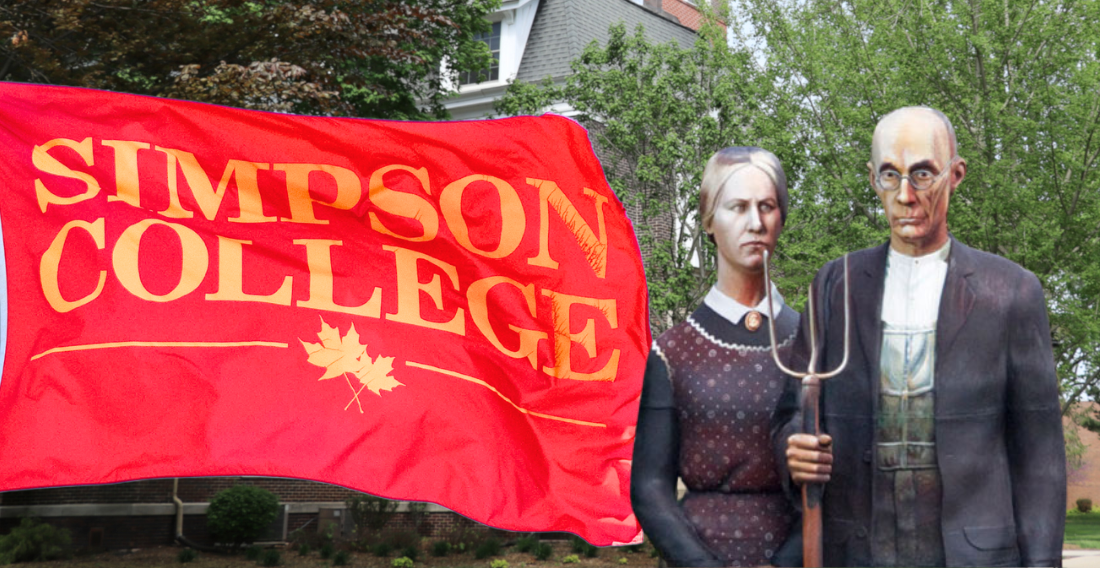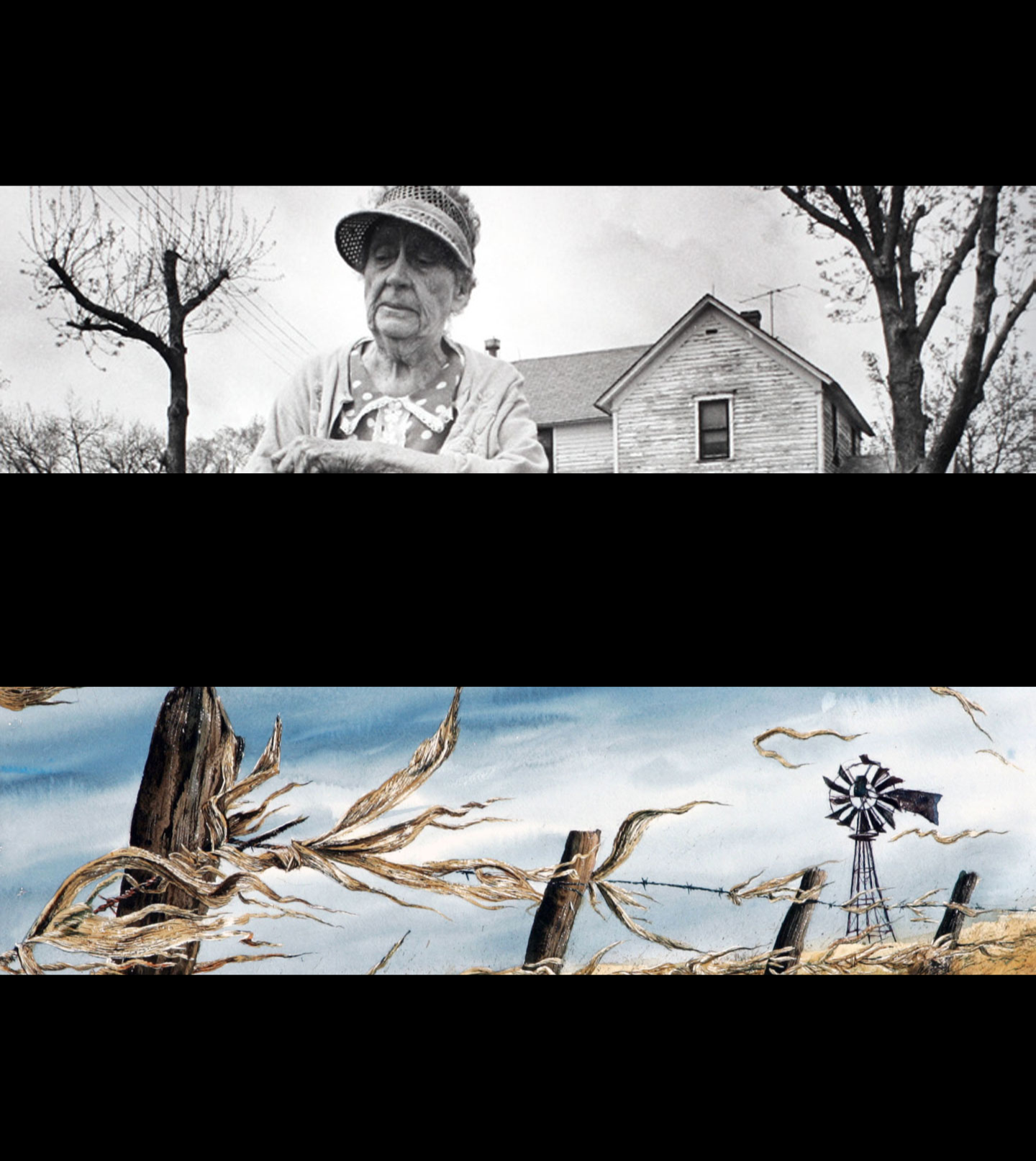Iowa History Center

Our state’s past is full of unforgettable stories, with new ones being written every day
The Iowa History Center at Simpson College advances the understanding and appreciation of Iowa history among the state’s students, scholars and general public. Through numerous programs designed to heighten public awareness and interest in Iowa history, the Center expands educational opportunities and makes this history more widely available and accessible.
On Campus and Beyond

Iowa History Speaker Series
Our Speakers Series offers programs on varied topics of Iowa history and culture. Speakers include nationally renowned authors, scholars, journalists, politicians and public figures. These events are free and open to the general public and held in Indianola.
Iowa History Internship Program
We facilitate hands-on experience for Simpson students in public history at local institutions like the State Historical Museum, the Iowa Jewish Historical Society and Living History Farms. The Iowa History Center provides cost-of-living stipends to students doing internships. Students interested in applying for these internships should contact the Iowa History Center for more details.
Iowa History Center Newsletter
Get up-to-date information in your inbox by subscribing to our newsletter. To be added as a subscriber, send an email to daryl.sasser@simpson.edu.
Annual Iowa History Quiz
Each February the Iowa History Center holds a student led trivia contest for students. Questions include general information about the state and Simpson College. Students eagerly compete because they are so passionate about the history of Iowa but also because there are fabulous prizes.
Field Trip Grant Program
We assist local schools in making Iowa history more accessible by funding K-12 students on Iowa history-oriented field trips. To apply, please fill out the 2024-2025 application form.
View ApplicationAnnual Award for the Outstanding Master’s Thesis in Iowa History
To encourage graduate study in Iowa history and honor outstanding work in the field, this annual award recognizes the best master’s thesis examining our state’s past. Selection is based on contribution of knowledge, originality of subject matter or methodology, use of sources and written expression. For further information, please contact Daryl Sasser at 515-961-1226 or daryl.sasser@simpson.edu.
Peterson Farm Crisis Photographs
“Dave Peterson’s fine photographs record an important and tragic part of our recent past,” said Bill Friedricks, who founded the Iowa History Center in 2006. “They provide a moving portrait of the very human dimension of the 1980s farm crisis, when many rural Iowans struggled to keep their homes and their land amidst tumbling crop prices. We at the Iowa History Center at Simpson College are dedicated to preserving Iowa’s history and encouraging discussion about this past. These photographs do just that.” Please contact the Iowa History Center about viewing or borrowing this collection.
Your gift today can protect Iowa’s past
Iowa’s history is too rich and important to ignore, yet few colleges and universities teach Iowa history, and little Iowa history is included in the public schools. To address these and other deficiencies, the Iowa History Center was founded in 2006.
Your gift can help support our mission. The Iowa History Center depends on donations to ensure that future generations learn the state’s history. To contribute a tax deductible donation or for more information, please contact Iowa History Center Director, Daryl Sasser at 515-961-1226, daryl.sasser@simpson.edu or Simpson College, 701 North C Street Indianola, Iowa 50125.
Student Work
The final projects showcased here are the result of an experiential learning and undergraduate research assignment from History 285: Thinking Historically, taught by Professor Daryl Sasser in Spring 2025. Students were asked to step into the role of historians by conducting original research using historical Iowa newspapers as their primary sources. These newspapers—accessed through digital archives, local libraries, or microfilm collections—offered a window into the everyday life, major events, and evolving identities of Iowa communities across a variety of time periods.
Through careful contextual research and creative synthesis, students crafted original arguments about Iowa’s local histories. These arguments took many forms, such as essays and podcast episodes, supported by primary newspaper evidence and relevant secondary sources.
These works not only reflect a semester of dedicated inquiry, but also contribute meaningfully to our understanding of Iowa’s diverse historical landscape. We are proud to present them here as part of the Iowa History Center’s mission to promote the study and appreciation of Iowa’s past.
Paper #1
This paper explores the architectural and cultural legacy of one of Western Iowa’s most enduring historic homes. Built in the early 1880s by Newell A. Whiting, a prominent hardware merchant and town founder, the Italianate Victorian residence reflects both the aspirations of its builder and the broader story of Onawa’s development. Blending historical scholarship with personal narrative, this paper traces the evolution of the Whiting House, from its original design and materials, through successive ownership by the Murphy family and others, to its present role as the cherished home of the author’s grandmother. Drawing on primary sources such as 19th-century newspapers, architectural surveys, oral histories, and family archives, the study examines how the house has been preserved, adapted, and lived in across nearly 150 years. More than a static monument, the Whiting House emerges as a dynamic site of memory and identity, embodying continuity through change and showing how ordinary people can act as stewards of the past. This case study contributes to broader conversations on historic preservation in rural America and the personal dimensions of architectural heritage.
View PaperPodcast
This podcast episode, rather than a traditional final paper, investigates the evolving portrayal of Native Americans in Ames, Iowa, between 1926 and 1973, as reflected in local newspapers. Through analysis of how Native Americans were discussed, represented, and often overlooked, the project traces a shift from nostalgic depictions of the "Wild West" to increased attention on acts of resistance, such as those at Wounded Knee. These changes reveal broader transformations in the cultural conscience of Middle America over nearly five decades.
Listen to PodcastPaper #2
This paper examines the 1857 Spirit Lake Massacre and the complex public responses that followed, revealing how frontier tensions between white settlers and the Wahpekute Dakota were both misunderstood and misrepresented. Led by Inkpaduta, a Wahpekute band killed over forty settlers and captured four women in an event that shocked Iowa and Minnesota. While settler accounts often exaggerated or sensationalized the violence, official government responses sought to downplay it, portraying it as the isolated actions of outlaws rather than a symptom of deeper conflict. By analyzing primary sources, newspaper articles, and government documents, this study argues that both public fearmongering and governmental minimization failed to address the underlying causes of the violence—namely land dispossession, treaty violations, and unresolved injustices like the murder of Dakota leaders by white settlers. The paper ultimately positions the Spirit Lake incident not as an anomaly, but as a harbinger of further conflict, culminating in the Dakota War and the ethnic cleansing of Dakota peoples from the region.
View PaperSeries of Zines
This project, presented in the format of a series of zines rather than a traditional academic paper, offers an in-depth exploration of the life and legacy of the abolitionist John Brown. Through a collection of visually engaging and thoughtfully curated zines, the project examines Brown’s life from a diverse range of perspectives, highlighting the complexity of his actions, beliefs, and the profound impact he had on the abolitionist movement and American history. By moving beyond a single narrative, this format allows for a more nuanced understanding of Brown’s controversial legacy and invites readers to engage critically with the questions his life continues to raise about justice, resistance, and the use of violence in the pursuit of moral causes.
View AlbumPodcast Presentation
This final project, presented as a podcast episode, examines how the study of the Underground Railroad, specifically Iowa’s involvement, enhances understanding of the historian’s role. Through research into the actions of ordinary individuals, the project emphasizes the importance of precision, empathy, and evidence-based analysis in historical interpretation, even when the complete narrative remains inaccessible.
View PresentationPaper #3
This paper explores the cultural, religious, and ethnic diversity that shaped the historical development of Dubuque, Iowa. From its founding in the early 1830s through the 19th century, Dubuque emerged as a uniquely inclusive city where multiple immigrant communities—including Irish, German, Polish, French, Jewish, and African Americans—established themselves and contributed to the city’s growth. The paper highlights how Dubuque’s geographic location on the Mississippi River, its lead mining industry, and its religious openness fostered a welcoming environment for settlers of varied backgrounds. Particular attention is given to the city’s religious pluralism, educational opportunities for women, and the challenges and contributions of African Americans in the community. By examining historical records, newspapers, and institutional developments, this study argues that Dubuque’s legacy as a diverse and collaborative city sets it apart in Iowa’s broader historical landscape.
View Paper
